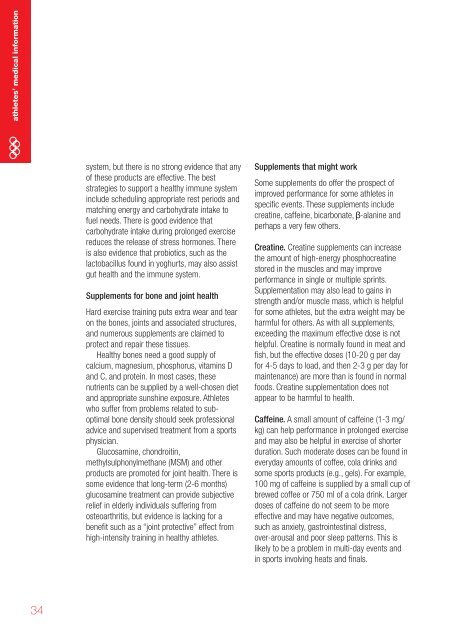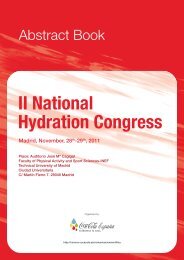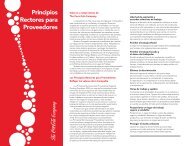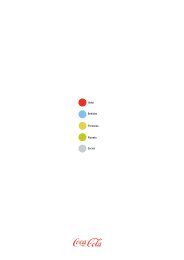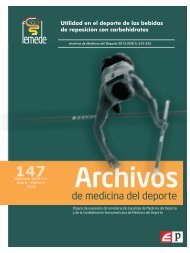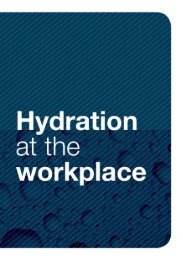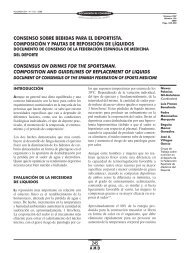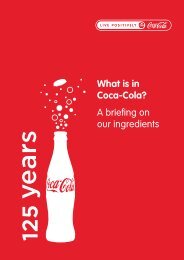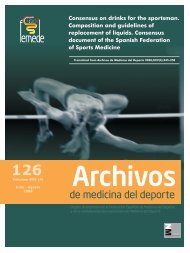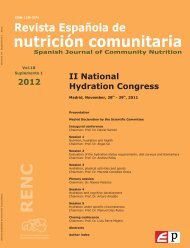Nutrition for Athletes - Coca-Cola
Nutrition for Athletes - Coca-Cola
Nutrition for Athletes - Coca-Cola
Create successful ePaper yourself
Turn your PDF publications into a flip-book with our unique Google optimized e-Paper software.
athletes’ medical in<strong>for</strong>mation<br />
system, but there is no strong evidence that any<br />
of these products are effective. The best<br />
strategies to support a healthy immune system<br />
include scheduling appropriate rest periods and<br />
matching energy and carbohydrate intake to<br />
fuel needs. There is good evidence that<br />
carbohydrate intake during prolonged exercise<br />
reduces the release of stress hormones. There<br />
is also evidence that probiotics, such as the<br />
lactobacillus found in yoghurts, may also assist<br />
gut health and the immune system.<br />
Supplements <strong>for</strong> bone and joint health<br />
Hard exercise training puts extra wear and tear<br />
on the bones, joints and associated structures,<br />
and numerous supplements are claimed to<br />
protect and repair these tissues.<br />
Healthy bones need a good supply of<br />
calcium, magnesium, phosphorus, vitamins D<br />
and C, and protein. In most cases, these<br />
nutrients can be supplied by a well-chosen diet<br />
and appropriate sunshine exposure. <strong>Athletes</strong><br />
who suffer from problems related to suboptimal<br />
bone density should seek professional<br />
advice and supervised treatment from a sports<br />
physician.<br />
Glucosamine, chondroitin,<br />
methylsulphonylmethane (MSM) and other<br />
products are promoted <strong>for</strong> joint health. There is<br />
some evidence that long-term (2-6 months)<br />
glucosamine treatment can provide subjective<br />
relief in elderly individuals suffering from<br />
osteoarthritis, but evidence is lacking <strong>for</strong> a<br />
benefit such as a “joint protective” effect from<br />
high-intensity training in healthy athletes.<br />
Supplements that might work<br />
Some supplements do offer the prospect of<br />
improved per<strong>for</strong>mance <strong>for</strong> some athletes in<br />
specific events. These supplements include<br />
creatine, caffeine, bicarbonate, -alanine and<br />
perhaps a very few others.<br />
Creatine. Creatine supplements can increase<br />
the amount of high-energy phosphocreatine<br />
stored in the muscles and may improve<br />
per<strong>for</strong>mance in single or multiple sprints.<br />
Supplementation may also lead to gains in<br />
strength and/or muscle mass, which is helpful<br />
<strong>for</strong> some athletes, but the extra weight may be<br />
harmful <strong>for</strong> others. As with all supplements,<br />
exceeding the maximum effective dose is not<br />
helpful. Creatine is normally found in meat and<br />
fish, but the effective doses (10-20 g per day<br />
<strong>for</strong> 4-5 days to load, and then 2-3 g per day <strong>for</strong><br />
maintenance) are more than is found in normal<br />
foods. Creatine supplementation does not<br />
appear to be harmful to health.<br />
Caffeine. A small amount of caffeine (1-3 mg/<br />
kg) can help per<strong>for</strong>mance in prolonged exercise<br />
and may also be helpful in exercise of shorter<br />
duration. Such moderate doses can be found in<br />
everyday amounts of coffee, cola drinks and<br />
some sports products (e.g., gels). For example,<br />
100 mg of caffeine is supplied by a small cup of<br />
brewed coffee or 750 ml of a cola drink. Larger<br />
doses of caffeine do not seem to be more<br />
effective and may have negative outcomes,<br />
such as anxiety, gastrointestinal distress,<br />
over-arousal and poor sleep patterns. This is<br />
likely to be a problem in multi-day events and<br />
in sports involving heats and finals.<br />
34


